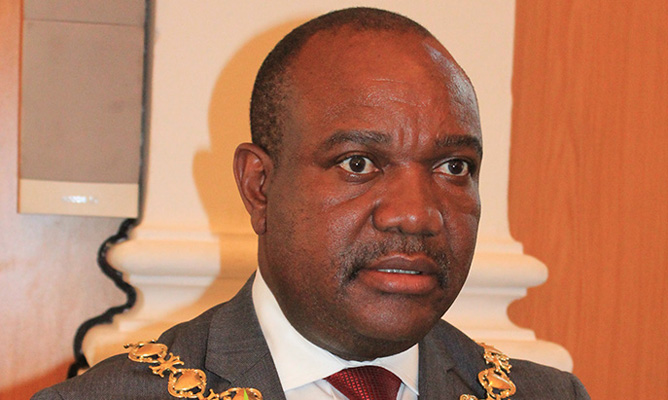
There is some rare good news in Zimbabwe. The Chartered Institute of Project Managers does exist. And it will be holding a Zimbabwe Project Management Conference at Montclair Hotel, Juliasdale on October 8 and 9.
Perhaps before then, the institute’s public relations department may like to share its charter with the public, Its values and principles, and what it takes to be a member or fellow could be interesting. Do they need some post graduate Masters/MBA in project management to qualify as a fellow of the institute for example?
The theme of the conference is Mastering Project Management in Mega Projects. Reviving the economy is the mother of all mega projects. This macro project could be helped from some serious project management skills.
One hopes government ministries’ top brass will attend the conference. Apart from poor fiscal management, as the sovereign debt burden shows, project management is the government of Zimbabwe’s second major weakness. If in doubt, think of the YTL power deal of yore and the recent NewZimsteel debacle. Remember the dualisation of the Harare-Norton and Airport roads, simple projects that took years to complete.
Energy and Power Development minister Samuel Undenge will be the guest of honour. It is an appropriate choice. The Zimbabwe Power Company managing director Noah Gwariro will be one of the speakers. There will probably be a power cut or two during the conference to remind all of the perils of poor project management.
Zinara acting chief executive officer Moses Juma will also be one of the speakers. He should prepare to answer questions on whether the dualisation of the Beitbridge to Chirundu highway is a viable venture and why we need Chinese engineers to do feasibility studies for such projects for the roads authority. A due diligence by Chinese financiers would be understandable, but a feasibility study raises troubling questions.
There will also be procurement specialists on the speakers’ panel, including one NewsDay columnist, Nyasha Chizu. Incompetent procurement is probably government’s third major weakness resulting in delays and huge losses due to deceit, misrepresentation, fraud, bid rigging and inefficiency, particularly in the infrastructure and construction industries.
In the two days the conference will run, the government will probably have lost hundreds of thousands of dollars from fraudsters in its various procurement departments. The Comptroller and Auditor General’s reports testify to the fact. Examples of procurement deficiencies include the “snow ploughs” that a parastatal recently imported, the outside broadcasting unit that cost a whopping million dollars instead of much less or the sulphuric acid, imported all the way from China that turned out to be dirty water.
- Chamisa under fire over US$120K donation
- Mavhunga puts DeMbare into Chibuku quarterfinals
- Pension funds bet on Cabora Bassa oilfields
- Councils defy govt fire tender directive
Keep Reading
The list of errors or fraud from purchasing departments is long, but it is worth recounting, if only to drive the point home to encourage government to take remedial action. Lest we forget however, there was also CMED’s three million or so litres of diesel that were never delivered, with the money vanishing into Harare’s thin air and the culprits probably going scot-free. The Air force’s four engine Presidential BAe 146 jet that was supposed to be long haul craft, turned out to be short haul one.

The recently appointed Minister of Macro-Economic Planning and Investment Promotion Obert Mpofu should be persuaded to attend the conference. If he is without mega project management experience, he may have no reason to be in the ministry unless he engages such experts as soon as possible.
That brings us to Zimbabwe’s fourth major weakness: Appointing the wrong skills, or when those are correct, then inexperienced ones, to key posts. Perceived loyalty and acquiescence to wrong directives takes precedence over everything else. The results have been disastrous.
Harare mayor Bernard Manyenyeni and his predecessor Muchadeyi Masunda have both moaned about it, President Robert Mugabe has also done the same, but no corrective action has been taken. Meritocracy is the way to go in management, especially of mega projects and ministries. If need be, the constitution must be changed to enhance the appointment of the right experienced skills in Cabinet and local authorities.
I could not identify an expert in ethical management on the speakers’ panel. I hope there is one, for unethical conduct, or corruption, is Zimbabwe’s fifth major weakness. Some will argue spiritedly, that it is the first. The mega projects sector is a haven, internationally, of massive corruption. And Zimbabwe ranks high in the field.
More often than not the government prefers opaque deals than going out to international public tender. Already it seems there is money to be made in solar geysers, raising the fear that the energy crisis could be man-made.
Organisational development experts, if on the speakers’ panel, will no doubt raise the issue of appropriate selection, training, mentoring, rewarding and retention of critical project management skills, as well as refining and retention of corporate and institutional memory. Government’s failure to retain first class skills and institutional memory is the sixth and hopefully the last of its major weaknesses. It tells on its project execution record.
Not much, of course, can be covered in two days of the conference, but the above mentioned weaknesses, could be the subjects of a fixed term presidential commission of inquiry, composed of the great and good such as those on the speakers’ panel and chaired by a retired Judge. It will address how the risks can be mitigated through a regulation framework, how government effectiveness can be raised and how corruption in mega projects can be tackled.
lTapiwa Nyandoro can be contacted on [email protected] or [email protected]











